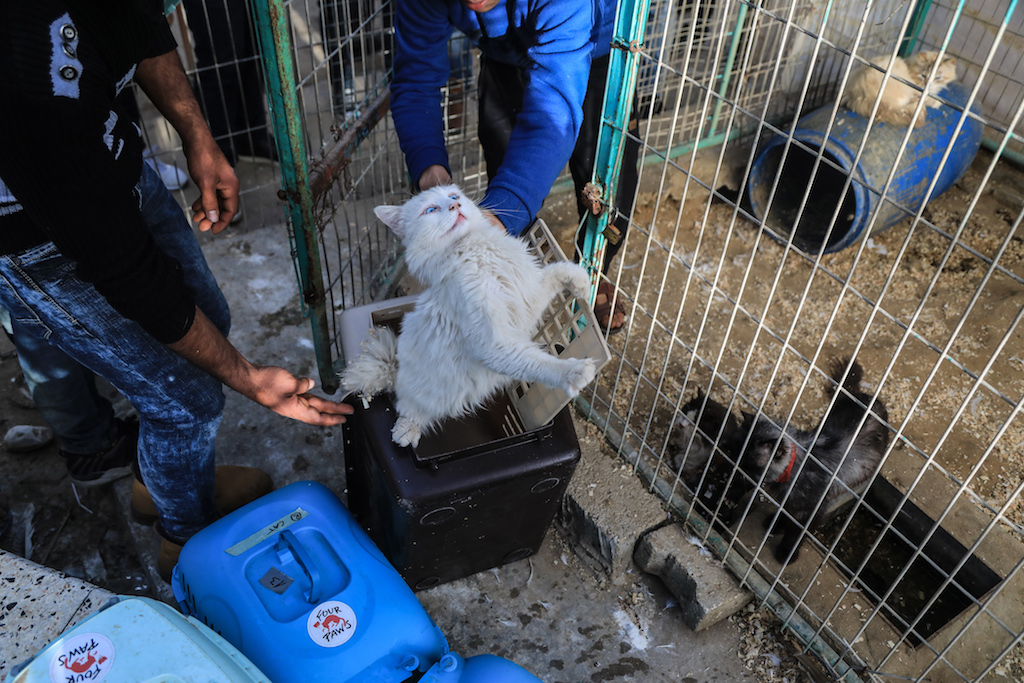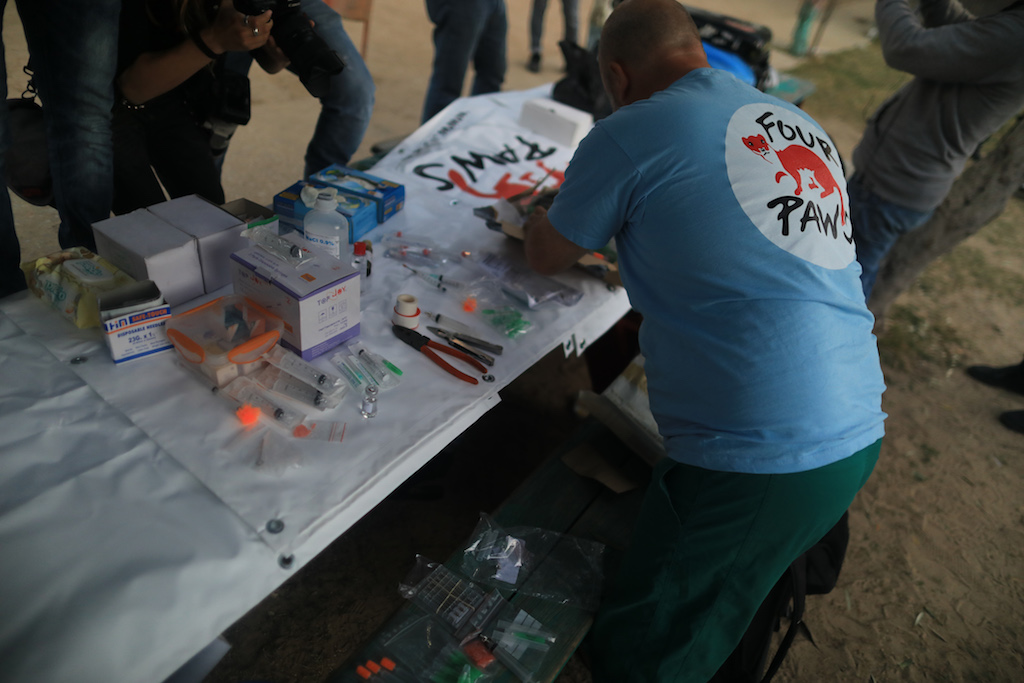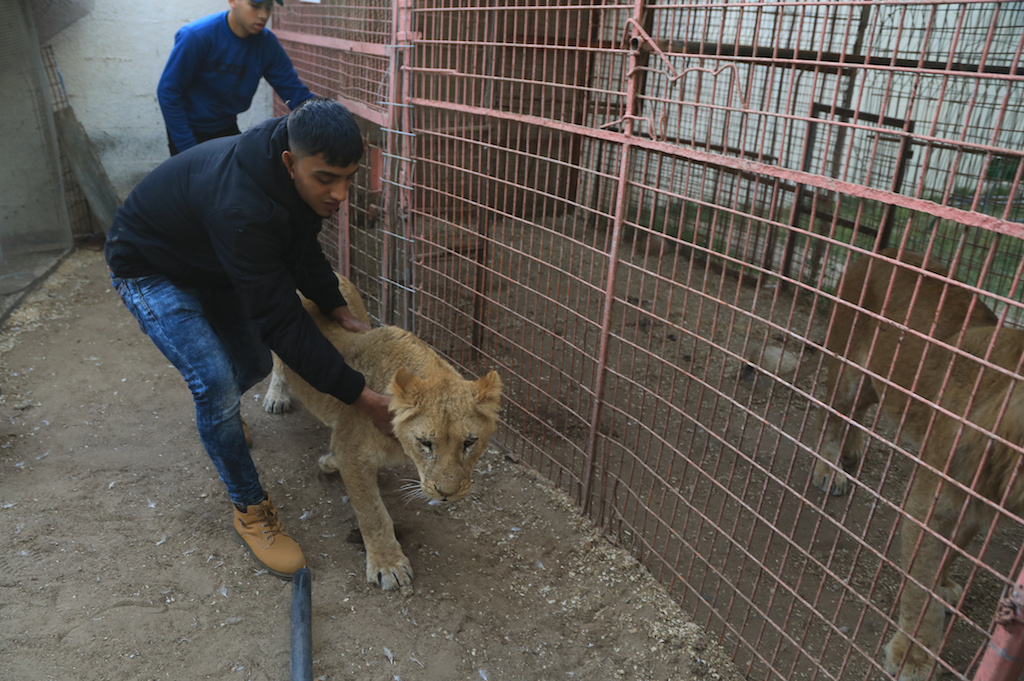Distressed animals in Gaza leave for nature reserve in Jordan

Four Paws, an international animal welfare organisation, on Sunday evacuated 40 animals from the Rafah Zoo in the south of the Gaza Strip.
The organisation, which helps animals under human control around the world, originally planned to do this almost two months ago, when the owner of the zoo, Fat-hi Jumaa, 53, posted online footage of a lioness being declawed.
The footage sparked an outcry from rights groups around the world, including Four Paws. While Jumaa told MEE that he did this as a promotion for his zoo because he wanted children to be able to play with the lioness, Four Paws called it “an act of cruelty.”
Speaking to MEE during his visit to the Gaza Strip to evacuate the animals, Amir Khalil, from Austria, said: “These [images] shocked hundreds of thousands worldwide, as it is forbidden in many countries and considered an act of cruelty because this lioness will not be able to practise her normal life…this is considered an inhumane act. He [the owner of the zoo] should not do this to [his] animals.”
Stay informed with MEE's newsletters
Sign up to get the latest alerts, insights and analysis, starting with Turkey Unpacked
Like most zoos in Gaza, this one, which is located in a refugee camp, was razed by Israeli bulldozers during a major military raid in Rafah in 2004.
It was rebuilt later, but in 2008-9 and 2012 Israeli offensives against Gaza, it was again partially destroyed.
“Gaza is a complicated environment for people and animals under the Israeli occupation,” Jumaa told MEE.
“Like people, many of the animals died during the repeated Israeli aggressions on Gaza. It was very clear how the behaviour of the animals changed. Some got wilder and some became dull.”
Cub deaths
Khalil said his organisation had been following the situation of animals in the Gaza Strip for some time, noting that the organisation had many concerns because of the clashes that had taken place in the devastated enclave.
Describing the life of the animals in the Gaza zoos, he said: “They live in small cages. Owners cannot afford food or medicines. Veterinary care is poor and the animals suffer from a lot of diseases."
He also pointed to the deaths of four lion cubs in January, after a windstorm had ripped off protective plastic covers from their cage.
Afterwards, Khalil said, his organisation made a concerted effort to try to get into the coastal enclave and help the distressed animals. The mission was planned for March, but was postponed over the latest tensions in Gaza.
“Mission postponed - but we are NOT giving up! Due to the recent military escalation, our team was not able to enter the Gaza Strip. We've evaluated the situation thoroughly & made the decision to postpone the mission to rescue over 40 animals at Rafah Zoo!” Khalil said in a video posted on the Four Paws twitter account.
The Ministry of Agriculture in Gaza facilitated the exit of the animals, he said.
“We gave all the needed permissions and offered all the needed facilitations to transfer 40 animals from Gaza to a natural reserve in Jordan,” the ministry said in a statement.
'Mercy'
Abu-Ibrahim al-Najjar, 88, thanked the international animal welfare organisation for helping Gaza's animals, but said that it would be good if there were also international welfare organisations that could help people.
“Mercy upon animals is very important and necessary because we have not enough resources to deal with them,” he told MEE.
“I am very happy to see these animals transferred to a natural reserve in order to be able to live their normal lives,” he said, adding: “Mercy for animals is needed, the same as it is needed for humans.”
Khalil Jarada, 47, a father of five children, appreciated the measure, which he said “was crucial to keeping the animals alive”.
Still, he lamented their loss.
"We used to visit a zoo two or three times a year,” he told MEE. “Now, I cannot afford the expense more than once a year, but if there are no animals in Gaza, what attractions will there be for the children?”
Middle East Eye delivers independent and unrivalled coverage and analysis of the Middle East, North Africa and beyond. To learn more about republishing this content and the associated fees, please fill out this form. More about MEE can be found here.







